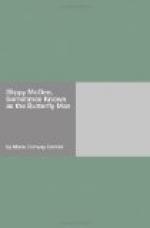“I don’t see,” said I, crossly, “why she should be called upon to faint for either of them. Inglesby’s—Inglesby. That makes him impossible. As for the boy, why, he rocked that child in her cradle.”
“That didn’t keep either of them from growing up a man and a woman. Looks to me as if they were beginning to find it out, parson.”
I considered his idea, and found it so eminently right, proper, and beautiful, that I smiled over it. “It would be ideal,” I admitted.
“Her mother wouldn’t agree with you, though her father might,” he said dryly. And he asked:
“Ever had a hunch?”
“A presentiment, you mean?”
“No; a hunch. Well, I’ve got one. I’ve got a hunch there’s trouble ahead for that girl.”
This seemed so improbable, in the light of her fortunate days, that I smiled cheerfully.
“Well, if there should be,—here are you and I to stand by.”
“Sure,” said he, laconically, “that’s all we’re here for—to stand by.”
Although it was January, the weather was again springlike. All day the air was like a golden wine, drenched in a golden sun. All day in the cedars’ dark and vivid green the little wax-wings flew in and out, and everywhere the blackberry bramble that “would grace the parlors of heaven” was unfolding its crisp red leaves and white buds; and all the roads and woods were gay with the scarlet berries of the casida, which the robins love. And the nights were clear and still and starry, nights of a beauty so vital one sensed it as something alive.
Because Mary Virginia was to spend that night at the Parish House, Mrs. Eustis having been called away and the house for once free of guests, my mother had seized the occasion to call about her the youth in which her soul delighted. To-night she was as rosy and bright-eyed as any one of her girl-friends. She beamed when she saw the old rooms alive and alight with fresh and laughing faces and blithe figures. There was Laurence, with that note in his voice, that light in his eyes, that glow and glory upon him, which youth alone knows; and Dabney, with his black hair, as usual, on end, and his intelligent eyes twinkling behind his glasses; and Claire Dexter, colored like a pearl set in a cluster of laughing girls; and Mary Virginia, all in white, so beautiful that she brought a mist to the eyes that watched her. All the other gay and charming figures seemed but attendants for this supremer loveliness, snow-white, rose-red, ebony-black, like the queen’s child in the fairy-tale.
The Butterfly Man had obediently put in his appearance. With the effect which a really strong character produces, he was like an insistent deep undernote that dominates and gives meaning to a lighter and merrier melody. All this bright life surged, never away from, but always toward and around him. Youth claimed him, shared itself with him, gave him lavishly of its best, because he fascinated and ensnared its fresh imagination. Though he should live to be a thousand it would ever pay homage to some nameless magic quality of spirit which was his.




